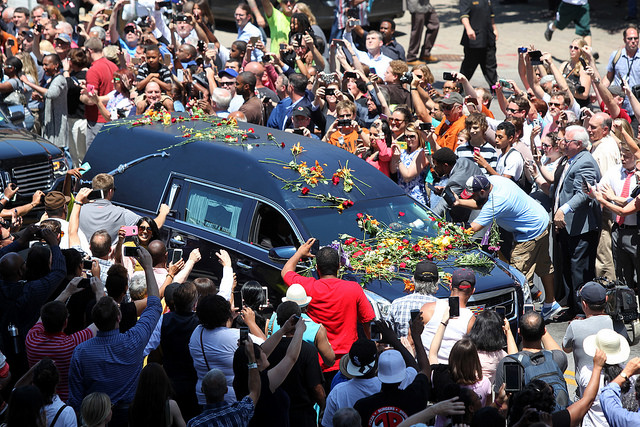Like this article? rabble is reader-supported journalism. Chip in to keep stories like these coming.
One great thing about Muhammad Ali’s funeral a week ago is that it responded to the hateful Trumpian garbage that got spewed after the Orlando slaughter and did so pre-emptively, mere days before. It answered in advance, as if Ali hadn’t just planned his own memorial but foreseen the need for it.
I was enthralled, I watched for three hours. It was profoundly, effortlessly ecumenical, yet wholeheartedly Muslim. It had none of the self-conscious straining you often see when people try too hard to be inclusive. It was also totally American in tone, with no hint of Islam as an imported force more at home elsewhere. Women were probably the most impressive component: Ali’s daughters, Malcolm X’s daughter and Ali’s awesome wife, Lonnie.
I even took delight in the normally self-promoting “Jewish progressive,” Michael Lerner, in full rabbinic gear. In the (Bill) Clinton years, Lerner urged supporters to send money to help him occupy a space in Clinton’s psyche, alongside less enlightened voices who’d be clamouring there. I imagine he’s still angling for entry to the Clinton cranium (Hillary’s) but he too was splendid.
It also illuminated the appeal Islam has long held for African Americans. It responded to their spiritual needs (whatever that means, i.e., anything) without the baggage of American Christianity’s ambiguous relation to slavery and racism. It’s similar with Islam’s appeal worldwide: it hasn’t been allied to an imperial force (at least not till Daesh) since the fall of the Ottoman Empire.
Much of Islam’s appeal lies in its relative doctrinal simplicity and the ease of its simple, uncluttered conversion process. That leaves lots of room for personal development afterwards. Ali’s own trajectory began with the Nation of Islam, under Malcolm X’s tutelage. When Malcolm left, protesting against racial exclusivism and corruption, Ali broke with him; he later called that his greatest mistake. He eventually followed Malcolm into mainstream Sunni Islam and then leaned toward the subtleties of Sufism. As a Muslim, he denounced the 9/11 attacks. The testimonies to his faith and its long evolution, based on peace and common humanity, by his kids and others were poignant.
How did this respond pre-emptively to the reactions of Trump and others following Orlando’s carnage? Trump blamed it on “radical Islam” and said Obama lacked the guts to call it that. Obama said speaking those words would do no good; Hillary said she wasn’t afraid to say them. My problem with the term is that it has no meaning, it refers to nothing actual. There’s no group called Radical Islam and no address or letterhead. There are Muslims you could call radical, if you define what you mean, who have no relation to terror; along with some, if a definition’s provided, who do. It simply lobs an open-ended category out there with which to spread panic and gather support among the fearful.
In general I don’t see the point of applying religion as an issue in these cases. The killer in Orlando was in some way Muslim but that was probably the least of his problems. He had a jumble of contradictory attitudes and poses that he shot his mouth off about, before shooting literally. He was, in other words, like many other loud-mouthed Americans such as Trump, who don’t know what they’re talking about but yap anyway. Then he went and got a gun.
It was no more about religion than the California pastor who said, “I think it’s great that 50 pedophiles were killed today.” Sure he’s in a religious setting but where does it get you to note that? There are endless counter examples and so what? Glenn Greenwald cites a poll showing U.S. Muslims are more gay supportive than evangelicals, Mormons or Jehovah’s Witnesses. They’re basically tied with U.S. Christians. Then you have that ecumenical Ali funeral.
It’s not that religion isn’t involved in these cases; it is but that fact’s unilluminating, because it can mean too many things. When I was young and indulged in the study of religions, there were attempts, like Huston Smith’s The Religions of Man (how things change, eh?) to define each “great” religion’s essence. It was fun but it was also delusional. Defining “it” didn’t mean it truly existed, it just meant you had a definition. Religion itself, in its innumerable actual forms, is, and always was, pretty much another word for human.
This column was first published in the Toronto Star.
Like this article? rabble is reader-supported journalism. Chip in to keep stories like these coming.




